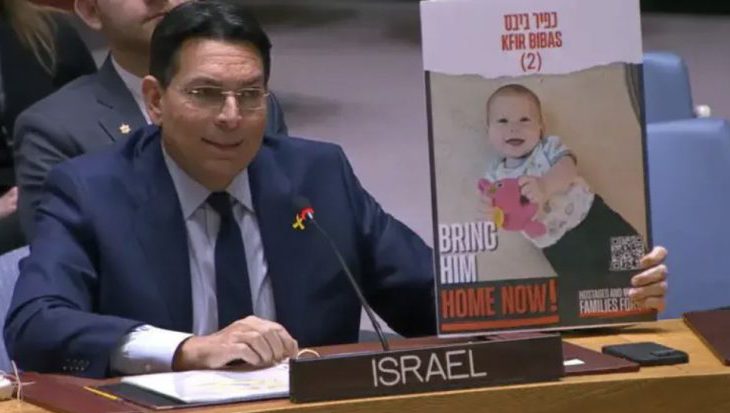Israel’s military triumphs now may pave the way for a historic opportunity to shift from defense to dialogue. Opinion.
Ambassador Danny Danon is Israel’s Permanent Representative to the United Nations.
(JNS) In 20 months, Israel has executed a string of extraordinary military operations that have fundamentally altered the strategic landscape of the Middle East.
With remarkable precision, its defense forces have decapitated terrorist leadership networks within Hamas and Hezbollah, weakened Houthi rebels in Yemen and, most significantly, launched a covert pre-emptive strike deep inside Iran, “Operation Rising Lion,” that, together with the United States that dealt a historic blow to the Islamic Republic’s nuclear-weapons program.
These achievements have not only scaled back the existential threats facing Israel, but they have also opened a rare window for regional peace.
The Islamic Republic’s destructive “Ring of Fire” strategy—designed to surround and smother Israel through its proxies in Lebanon, Syria, Gaza, Iraq and Yemen—has now been gravely compromised. And as that ring of existential hostility collapses, a new vision is emerging: a “Ring of Hope” rooted in regional integration, expanded normalization and a reimagined Middle East.
In response to the Hamas-led massacre in southern Israel on Oct. 7, 2023, the bloodiest day in Israel’s history, we launched “Operation Swords of Iron.” That operation dismantled Hamas’s command structure in Gaza, targeting its military infrastructure while making the effort to minimize civilian casualties in one of the world’s most densely populated regions. With Hezbollah joining forces with Hamas almost immediately after Oct. 7, Israel reacted, eliminating scores of senior Hezbollah terrorists and destroying strategic military targets.
The key turning point came with “Operation Rising Lion.”
For more than a decade, Israeli intelligence had monitored Iran’s nuclear ambitions with alarm. While diplomacy stagnated and international will to act forcefully waned, Iran accumulated a massive arsenal of ballistic missiles, enriched uranium to near weapons-grade levels and buried advanced centrifuges deep underground across Iran.
In a meticulously coordinated strike, Israel launched the military operation and struck core elements of Iran’s nuclear-weapons development program, including critical centrifuge manufacturing plants, missile guidance systems and cyber command centers. The world may never know the full details of the operation, but its results are undeniable: Iran’s nuclear program has been set back by years, its credibility shaken, and its deterrence severely weakened.
These actions represent more than just tactical victories. They are strategic ruptures in Iran’s long-standing regional doctrine: the encirclement of Israel via armed hostile proxy groups. For decades, Tehran invested billions into building this macabre “Ring of Fire,” arming Hezbollah with hundreds of thousands of missiles, funding Hamas and Palestinian Islamic Jihad in Gaza, and mobilizing Shi’ite militias from Iraq to Yemen.
The goal was explicit: to annihilate the State of Israel.
But that doctrine is now unraveling. Hamas is leaderless and crippled. Hezbollah has retreated, with its Iranian sponsors increasingly overstretched at home. And perhaps most importantly, the Iranian people, who have bravely risen up time and again against their regime, have gained hope from these setbacks, sensing that the tide may finally be turning.
And yet, throughout this period of profound transformation, the United Nations, tasked with upholding global peace and security, has done more to hinder progress than help it. While Israel acted decisively to neutralize genocidal threats and protect its citizens, the United Nations too often responded with paralysis, moral equivalency or outright hostility toward Israel and the United States.
Israel’s enemies were emboldened by the endless U.N. Security Council and General Assembly sessions and misdirected resolutions. The United Nations’ failure to call out Tehran’s sponsorship of terror, its silence on Hamas’s use of civilians as human shields and its refusal to recognize Israel’s right to self-defense have not only undermined its credibility; it has cost lives.
Israel’s military triumphs now pave the way for a historic opportunity to shift from defense to dialogue. The Abraham Accords have already shown what is possible when Arab and Muslim nations reject the politics of rejectionism.
In just a few short years, Israel has normalized relations with the United Arab Emirates, Bahrain, Morocco and Sudan. These agreements have led to booming trade, tourism and technological cooperation, proving that peace is not just possible but mutually profitable.
Now, with the threat from Iran temporarily contained, the door is open to expand this circle of peace. Other Gulf countries joining the Abraham Accords could dramatically reshape the region. But beyond the Gulf, there are broader horizons. Muslim-majority nations in Asia and Africa are increasingly reconsidering old animosities in favor of mutual interests.
Israel has always lived in a tough neighborhood. It has never had the luxury of complacency. But in this moment, after one of the most consequential years in our history, we have earned the right to look forward with confidence.
Challenges of course remain. Iran is unlikely to abandon its ambitions entirely. Hezbollah still poses a threat. And bad actors will seek to undermine any progress. But for now, Israel has reasserted its deterrence, safeguarded its citizens and defended the values of democracy and freedom in a region too often defined by terror.
This is not just a military story. It is a moral one. In defeating those who seek to destroy it, Israel has cleared a path not just for survival, but for peace. The “Ring of Fire” has been pierced. Now is the time to forge a “Ring of Hope.”





